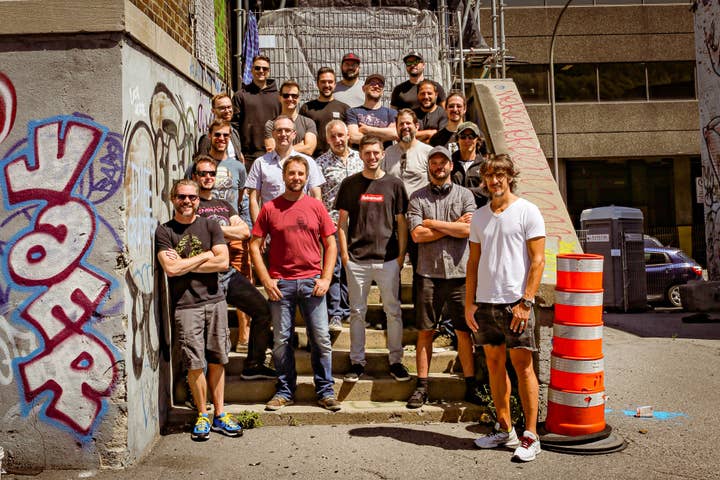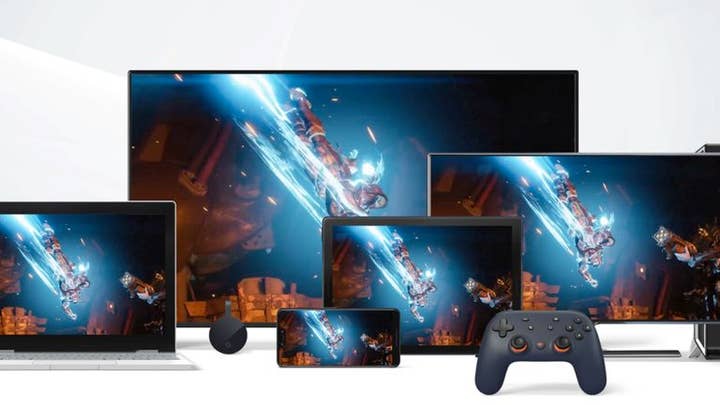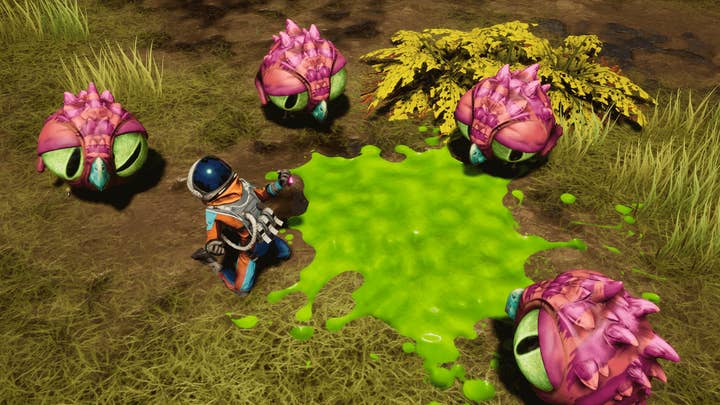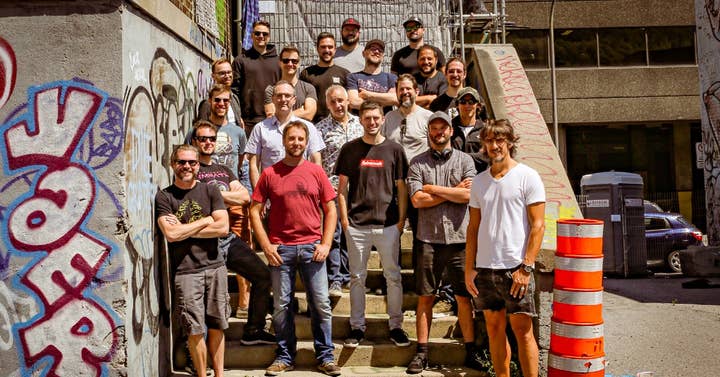Life after Stadia: Raccoon Logic picks up where Typhoon Studios left off
Reid Schneider on "round two" for Journey To The Savage Planet team and why internet giants struggle to get into games
A team of former AAA developers have today announced the formation of a new studio in Montreal, named Raccoon Logic.
Except 'new' might be something of an exaggeration: most of the team were already working together until earlier this year, when Google shut down its internal Stadia Games & Entertainment studios.
Raccoon Logic is formed by many of the folks who had previously been at Typhoon Studios, the studio behind comical sci-fi shooter Journey to the Savage Planet -- a studio which Google acquired and brought into the Stadia fold back in 2019.
When Stadia's studios were shut down, the former Typhoon founders realised they had an unusual situation.
"We all left the corporate world -- Ubisoft, Warner Bros, EA -- so it's really cool to be independent again and focus on making weird, quirky stuff that's different"
"It's very rare that everyone gets laid off at the same time, so you don't have issues with poaching people from other companies," studio head, executive producer and co-founder Reid Schneider tells GamesIndustry.biz.
"It was this unique moment in time and we felt like we had unfinished business to take care of. We were like 'Well, what if we put the band back together?'"
Schneider estimates that 75% of the Raccoon Logic team are former Typhoon staff, including his fellow co-founders: creative director Alex Hutchinson, CTO Yannick Simard, art director Erick Bilodeau, and technical design director Marc-Antoine Lussier.
The team isn't starting from scratch, either. Recognising that Google was no longer going to make content internally for Stadia, Schneider and his colleagues inquired about reclaiming the IP rights for Journey to the Savage Planet. And Google obliged, although buying back Typhoon's creation took some work.
"Google's used to acquiring things, but not necessarily divesting them," says Schneider. "Getting the code and the IP back actually took longer than the acquisition because they just weren't used to this kind of thing."

Even 505 Games, the game's original publisher, consented to the transfer, setting up Raccoon Studios as Typhoon Studios 2.0 in all but name.
"These projects become your baby," says Schneider. "You put so much time into them, and it's so hard to create a new IP that actually resonates. There are bodies everywhere of games where people were like 'Meh, okay...' so it felt like we had bottled lightning, and we had this unfinished business, all these cool ideas of what we wanted to do next. So to get that back was great."
"Google's used to acquiring things, but not necessarily divesting them. Getting the code and the IP back actually took longer than the acquisition"
As with any new (well, new-ish) studio, the Raccoon Logic team needed financial stability. They found it in Chinese games giant Tencent, which has made a minority investment in the company -- the only entity outside the co-founders to fund the new business, which remains primarily independent.
"That was important to us," says Schneider. "We all left the corporate world -- Ubisoft, Warner Bros, EA -- so it's really cool to go and be independent again and just focus on making weird, quirky stuff that's different."
Given this reverence for the independent world, it's surprising that the Typhoon Studios team sold to Google before their debut title had even shipped. Schneider admits that they "never planned to sell the company" but none of the team had worked at a first-party before, which appealed to them.
To an extent, the Typhooners still didn't get much of a chance to work at Google. After the acquisition, they remained in their own studio working on the launch of Journey To The Savage Planet, and then the inevitable post-launch patches, bug fixes and DLC. This took the team until "late Spring" in 2020, with plans to move into a Google office in Montreal by the end of March.
"But then we all went to our basements," Schneider says. "Obviously, no one could have predicted a worldwide pandemic -- that was a bit of a leftfield curveball we didn't expect."

Working remotely, the team focused on two tasks: preparing the Stadia version of their game and doing research and development for ideas around cloud-native gaming. Journey to the Savage Planet launched on Stadia in February 2021... just before the studio was closed and the entire team was laid off.
While Schneider remains appreciative of the opportunities and support Google offered, it's clear he's not exactly devastated by the closure. Not only was this a chance to get the Typhoon band back together, it had also become clear over time that Google "is a platform company, not a content company," which was at odds with the team's own ambitions.
"For all the people working at Raccoon Logic, this is a continuation. We can just pick up where we left off in February"
In another unusual circumstance, Google actually included the projects that the team was incubating along with the source code and IP rights for Journey to the Savage Planet.
"For all the people working at Raccoon Logic, this is a continuation so all that stuff isn't lost," says Schneider. "We can just pick up where we left off in February."
He acknowledges that this may not be true for everyone who worked at Stadia Games & Entertainment, noting that some people's projects will "now never see the light of day, which is really unfortunate."
This brings up the question of Google's entire strategy when it comes to Stadia. We've spoken directly to the company about this earlier this year -- twice, in fact -- but Schneider seems to have cut to the core of the issue: Google is a platform business rather than a content one. And that's something Google itself seems to agree with given its plans to make the technology available to other publishers.
Whatever faults Stadia still has, Schneider maintains that the technology is not one of them -- "It was really the only way to play Cyberpunk at launch," he says -- and hopes the games streaming service will find success in some form. But he acknowledges that this will be no easy task, even for a company as large and resourceful as Google.
"It's going to be tough -- gamers are a notoriously cynical bunch," he says. "The reality is technology is a means to an end, but the reason people go to platforms is content. It's definitely going to be an uphill battle, but we wish them all the best. If you look at the moves Sony, Nintendo and Microsoft are making right now, it's all about content. Content is king. Same for streaming services -- if you're a parent, Disney+ is almost a requirement now."

Stadia's struggles bring up the larger question of why big tech and internet firms stumble when it comes to video games. It's not just Google, of course; Amazon seems to be caught in a pattern of launching a new internally-developed video game and then almost immediately retiring it. What is it these companies are failing to get to grips with?
"The reality is games are really, really hard to make," says Schneider. "Every game that comes out is a minor miracle -- good games are a mega miracle.
"We found [our game] funny, and fortunately other people did... Now we're taking another run at it -- and hopefully they still find us funny"
"I think it's tough to put together new teams and expect lightning in a bottle or magic. Which is why you start to see a lot of acquisitions in this space. If you think about the maths -- the cost of setting up a studio and hiring people vs the cost of acquiring someone -- it's more expensive to acquire, but at least you're getting people who know how to work together well."
He points to Amazon's efforts, where they have "tried to put together new things from the ground up" while also trying to centre it around their own Lumberyard engine and contending with the pressure that comes with the fact that almost everything else Amazon has ever launched has thrived.
"If you look at how Microsoft has handled it, obviously they've had ups and downs, but they're new strategy is all about acquisitions because they know they're getting teams that know how to do this stuff together," he says. "It can be really tough to put new people in a room and expect magic."
Not that Raccoon Logic has any intentions of being acquired (again) just yet. Schneider says the team plans to stay independent for at least a few years -- "let the scars heal," he laughs -- while it works on rebuilding what it had with Typhoon Studios, and improving upon it. Having so many former staff back on board suggests they're on the right track.
"In Montreal, people have the choice of every studio you could ever imagine," he says. "The fact they wanted to come back for round two with us is really great, and it's a validation that they enjoyed the experience. What I'd like to do moving forward is to really ensure that people are enjoying the ride more. I mean, it's work, it's never going to be day camp, but we want to make sure people are enjoying their time.
"We only have a set number of games, projects or jobs in a lifespan so let's make all of them count, make sure they're great experiences and make sure people are having a good time while they do it."
The team currently stands at around 20 people, with no plans to grow beyond 30 to 35 -- a far cry from the 300-strong studios its co-founders used to be a part of.
The future of Raccoon Logic doesn't look too dissimilar from the one Typhoon once faced. The studio has the Journey to the Savage Planet IP and while Schneider doesn't confirm a sequel is in the works, he does say the team will still focus on core console and PC games, with "zero interest in mobile or VR." This certainly fits with the make-up of the team: the co-founders alone have worked on titles such as Assassin's Creed, Far Cry, Army of Two, Battlefield, Watch Dogs, and the Batman: Akrham series.
But that's not to say Raccoon Logic wants to compete with these franchises. Instead, it wants to build on the ethos behind Typhoon's sci-fi shooter, making something quirky and different. Schneider reports fans praised Journey to the Savage Planet for its "Monty Python-style, very British humour sensibilities," which is what the team was aiming for.
"So many games now are so serious," he says. "If you're Naughty Dog and you can pull off The Last Of Us, more power to you, but if you're trying to make something that's super serious and it doesn't land, it feels ridiculous.
"As an indie, we wanted to embrace the weird, make the whole thing a joke. We found it funny, we hoped other people would, and fortunately they did... Now we're taking another run at it -- and hopefully people still find us funny."

